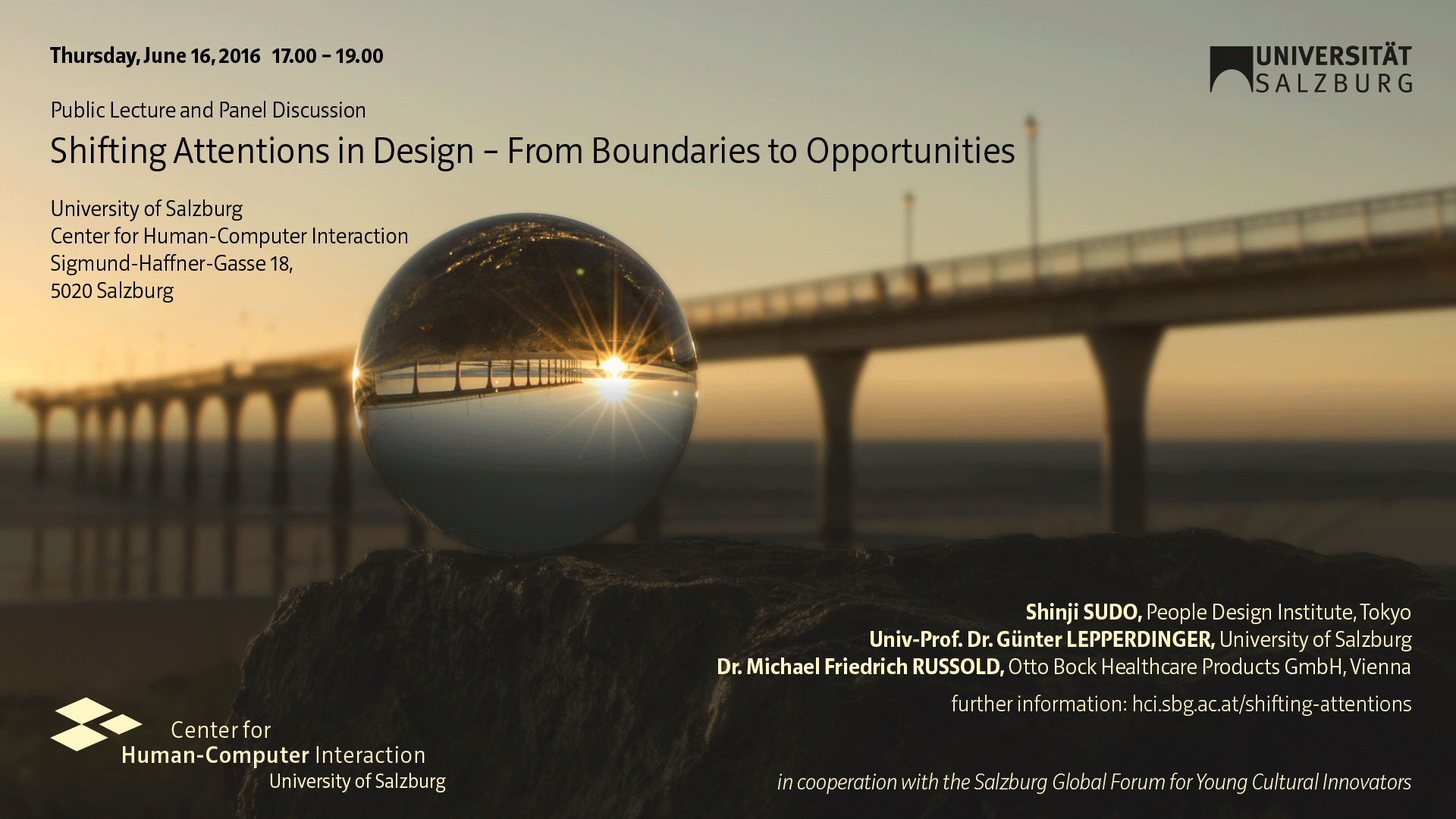In cooperation with the Salzburg Global Seminar / The Salzburg Global Forum for Young Cultural Innovators, we cordially invite you to join us for a Lecture and Panel Discussion (open to the public) on
“Shifting Attentions in Design – From Boundaries to Opportunities”
Thursday, June 16, 17.00 – 19.00
Center for Human-Computer Interaction, University of Salzburg
Sigmund-Haffner Gasse 18, 5020 Salzburg
Following the panel discussion, the Center for Human-Computer Interaction cordially invites to continue the conversation with some drinks.
Barrier-Free in each mind
What are design challenges imposed by an ageing society? What are design challenges imposed by mild or severe impairments? How can design of technologies address boundaries imposed by varying human conditions? How can design turn such boundaries into opportunities that are of benefit for everyone (“design for all”)? How can society benefit from technologies designed for impaired people and vice versa?
This lecture and panel discussion will critically reflect upon such questions, highlighting that it is not only about designing within certain boundaries (that are, for example, imposed by the process of ageing), but that we can design for far-reaching opportunities for society as a whole. Computational and non-computational artefacts can help to eradicate boundaries that separate impaired from non-impaired people, younger from elderly people, by designing for all and being “barrier-free in each mind”.
For this discussion, we are very happy to announce that Shinji Sudo (People Design Institute, Tokyo), Günter Lepperdinger (Professor at the Department of Cytology and Physiology, University of Salzburg), and Michael Friedrich Russold (Otto Bock Healthcare Products GmbH, Vienna) will be part of this highly interdisciplinary panel discussion to reflect upon these opportunities from various perspectives.
Panelists
Shinji SUDO is the founder of People Design Institute, NEXTIDEVOLUTION and the marketing consulting firm Fujiyama Store. In addition he has launched a collaborative project with Keio Gijuku University, called “People Design Lab”. With his second son born with cerebral palsy, he has been questioning, as a father and as a social innovator, the decisive chasm between handicapped and non-handicapped people. It is Mr. Sudo’s firm conviction that people design out to be understood as the multitude of possibility for uniqueness. He thinks that the current social and political debates are not helping to eradicate boundaries separating the handicapped from the non-handicapped people. Based on this belief, he has been organizing various projects in the realm of education, product design, services, and job creation. Together with leading designers he develops products that are not merely practical for the handicapped but also marketable commodities for the non-handicapped. He has also been working extensively with institutions in higher education including, but not limited to, Delft University of Technology in Netherlands and Waikato University in New Zealand, offering lectures to postgraduate students.
Günter LEPPERDINGER is full Professor at the department of Cytology and Physiology at the University of Salzburg. He is member of the “Geronto-Network”, which comprises a largely multidisciplinary team of researchers. Their common focus is to specify potential opportunities to induce healthy ageing in humans. The traditional paradigm of science for its own sake in various fields is simply not commensurate with the urgent need to formulate new and innovative responses to demographic change. Hence only innovative approaches will assist society to make longevity an asset for social and economic development. When aiming at developing services, products, and technologies to support innovative measures for healthy aging, the end users of research, including public stakeholders, practitioners, product designers and producers, older people, NGOs, must be engaged.
Michael Friedrich RUSSOLD is department head of Translational Research at the Vienna research and development facilities of Ottobock. Ottobock is market leader in the area of upper and lower extremity prosthetic devices following amputation. Ottobock Vienna is the leading research and development facility of the Ottobock group and focuses on “orthobionic” (technological solutions that are designed based on a detailed analysis of nature) and “bionic mobility” (prosthetic designs that allow to regain as much mobility as possible). Dr. Russold holds a Master in electrical engineering from the Technical University Vienna as well as a PhD obtained at the Department of Human Anatomy and Cell Biology at the University of Liverpool. As head of Translational Research he is an expert in the interdisciplinary transfer of basic research into high-tech products (e.g., prostheses) for the global market.

